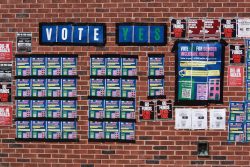Starting next year, there will be no more sophomore apartment lottery, no more exiled first-years will be holed up on the first floor of Darnall, and seniors will be partying it up in Village B.
Last week, the Office of Housing and Conference Services informed undergraduates that it can now guarantee four years of on-campus housing to all interested students. As of fall 2003, the completion of the Southwest Quadrangle will open up enough space for all first-years and sophomores to live in dorms, while upperclass students will take over all campus apartments and townhouses. Students should still have the option of living off campus their junior and senior years, but the new campus housing situation offers many advantages.
The new policy will make finding housing more convenient and less stressful for students. Until now, students have had to start looking for off-campus housing almost a year in advance. While a few lucky bargain-hunters find cushy off-campus apartments and houses that cost less than on-campus housing, such deals are elusive for most students, who can just as easily end up paying exorbitant rent for an undesirable or remote off-campus residence. Once they move off campus, many students face the additional stress of dealing with greedy or negligent landlords who withhold security deposits or refuse to fix faulty appliances. On campus, Facilities Management provides fairly timely and reliable service when something breaks?and most importantly, it doesn’t cost extra.
Increased on-campus housing will alleviate some safety concerns as well. The Department of Public Safety regularly patrols on-campus housing complexes and walkways, but the surrounding streets are not as well-monitored, well-lit or heavily trafficked. Muggings and assaults occur far more often in neighborhoods like Burleith and West Georgetown, outside of DPS’s jurisdicton and away from emergency call boxes. Many of these incidents could be prevented if fewer students had to venture off campus to get home at night. Currently, students sometimes have to wait half an hour or more for SafeRides to take them home. With more students living on campus, SafeRides would become a faster and more appealing option for students who did choose to live outside Healy Gates, further eliminating their safety concerns .
The new housing situation will foster a better sense of community, especially for juniors and seniors, who have often found themselves far from friends and activities on campus. Students will interact more often, participate in more campus clubs and develop a better sense of unity and school spirit if they are encouraged to live in a centralized area for all four years. If fewer undergraduates occupy houses in nearby neighborhoods, graduate students will be able to move closer to Georgetown and become a more visible presence on campus. Including students from both undergraduate and graduate programs in University events will diversify the community and improve quality of life for all students.
True, it’s a shame that sophomores will no longer get a chance at those sweet Prospect Street Village A’s. And seniors would still probably prefer to live in the Cloisters than in the Henle fishbowl. But if students are open-minded about the changes that the new housing situation brings, they may find that the opportunities it affords them will improve all four of their years at Georgetown.




